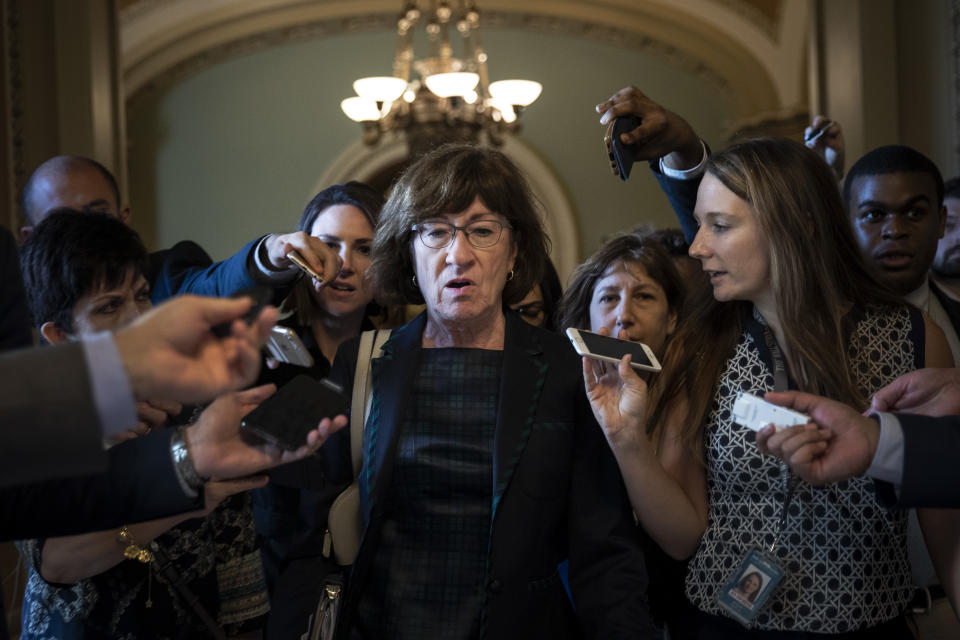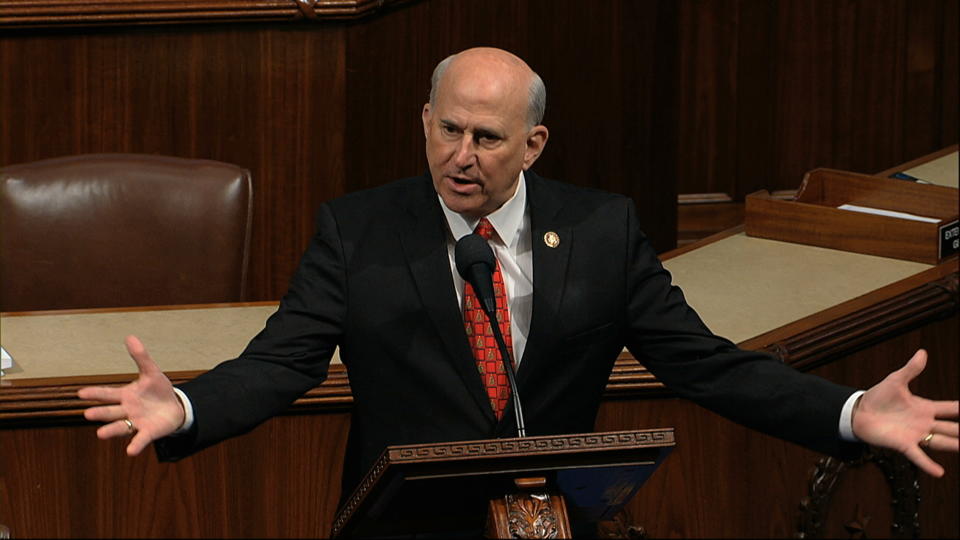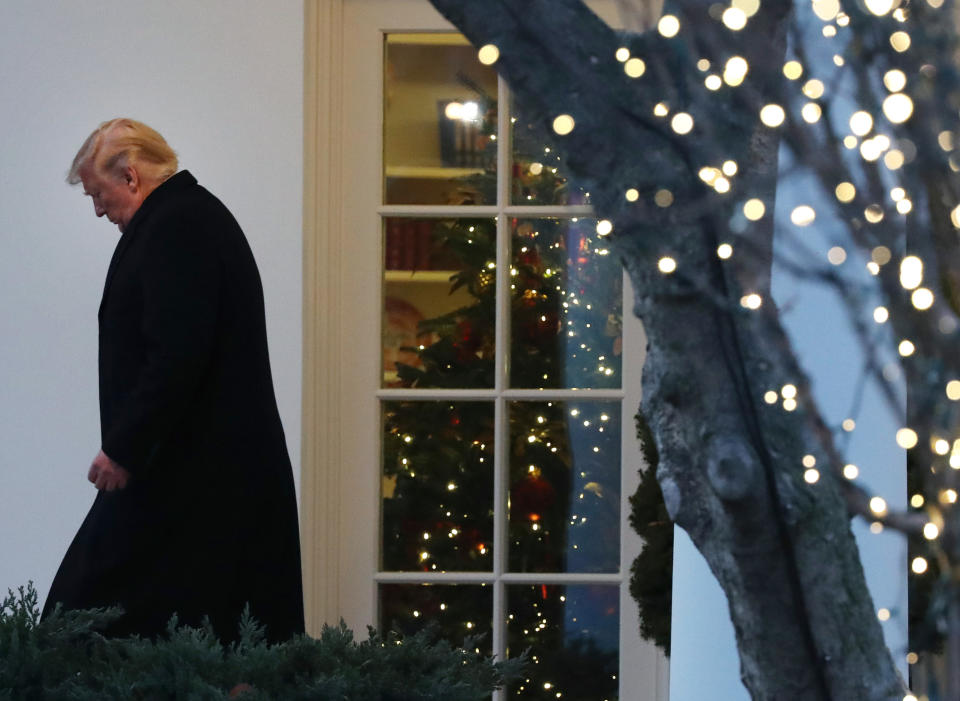Impeachment day arrives with many speeches and little drama
WASHINGTON — The seats were mostly empty on the House floor. Above, in the gallery reserved for members of the public, many seats were empty too. The president of the United States was about to be impeached, and curiously few people appeared to be paying attention.
The U.S. Congress likes to think of itself as the world’s most finely tuned legislative machine. And here it was, in the midst of its most consequential action, about to recommend that a sitting president be removed from office. Here were the ancient gears of democracy, taking a turn they had taken only 19 times before in American history (most of those impeachments were of federal judges).
But even before the day began, everyone knew how it was going to end: with the impeachment of Trump by a sizable Democratic majority. And so two sides that rarely agree on anything appeared to agree on the unspoken agenda of the day: Let’s get this over with.
Absent was the incredible tension of last year’s Senate confirmation hearing of Supreme Court nominee Brett Kavanaugh, who was accused of sexual assault. There were no surprise confrontations like the one between a sexual assault survivor and Jeff Flake, R-Ariz., which led the rattled senator to ask for an FBI investigation into Kavanaugh’s alleged sexual misconduct.
There were memorable witnesses throughout the impeachment inquiry, but nobody like Kavanaugh’s main accuser, Dr. Christine Blasey Ford. Nor did Trump deliver anything like Kavanaugh’s furious defense, though he has sent plenty of angry tweets.
Back then, every word uttered by “swing” Republicans like Lisa Murkowski of Alaska and Susan Collins of Maine was parsed for how they might vote on Kavanaugh. This time around, the votes have been predictable. The fates of U.S. representatives, after all, are much more fickle than those of senators, who enjoy six-year terms. And with the next election only months away, there is little room for courage — or surprise.

And so as debate over procedure turned into debate over foreign aid, which briefly turned into a discussion over whether Franklin D. Roosevelt should have been impeached (this point courtesy of Rep. Ken Buck, R-Colo.), some members tapped away on their smartphones. Others chatted pleasantly.
Cable news pundits depicted a capital locked in ferocious partisan combat, but the House members who showed up for Wednesday’s impeachment debate appeared to be in observably high spirits. Sitting in wait for the opening gavel to sound, Max Rose of New York and Pramila Jayapal of Washington State, both Democrats, laughed at some protracted joke, only later assuming more somber expressions.
Standing in a hallway with other members of Congress were Peter Welch, a Democrat from Vermont, and Guy Reschenthaler, a Republican from Pennsylvania who served in Iraq. They did not appear to be trading blows of the literal or figurative variety. To the contrary, the conversation appeared to be perfectly pleasant.
Speaking before the vote, Rep. Elissa Slotkin, a first-term Democrat from Michigan, said she was already looking towards other matters. She said she was pleased that President Trump and House Democrats had agreed on a new North American trade agreement. She also said she was looking forward to working on prescription drug pricing.
And sure enough, on the floor there were Republican invocations of a “sham” impeachment process and, from Democrats, charges that Trump had betrayed the oath of office. Rep. Mike Kelly, R-Pa., likened the impeachment vote to the Japanese attack on Pearl Harbor during World War II.
“This country’s end is now in sight,” Rep. Louie Gohmert, R-Texas, ominously predicted. “I hope I don’t live to see it.”

Rep. Jerry Nadler, D-N.Y., then accused Gohmert of disseminating Russian propaganda. Gohmert did not appreciate being called a Kremlin stooge and shouted back at Nadler. Still upset — and rather visibly so — he crossed the aisle, and standing over Nadler, spread his arms in what looked like a gesture of dismay. Then he went back to his seat. Within minutes, Gohmert was back on his phone, lost in his screen.
Not everyone was apocalyptic or combative. In fact, most members were neither. Rep. Paul Mitchell, R-Mich., warmly ushered Rep. Val Demings — a Democrat from Florida and a ferocious critic of the president — onto a members-only elevator, making sure there was room for her in the crowded cab.
All that was left was to repeat the same arguments and talking points that had been deployed during the two months of the impeachment inquiry. The Democrats should not try to undo the 2016 election, Republicans said. Republicans should not protect a president who abused the power of his office, Democrats said.
And both sides said that the United States was the last and greatest hope on Earth. They both quoted, more than once, Benjamin Franklin’s memorable insight that the United States was “a republic, if you can keep it.” They alluded to Alexander Hamilton, and the whistleblower, and the Washington Post, and Twitter.
So it went on for hours. Gentlemen from Florida yielded their time to gentlewomen from New York. Arguments were militated for and against impeachment, the same arguments that had been militated many times before. The debate continued through the morning and through the afternoon, and into evening, though it was less of a debate than a series of disconnected speeches of varying truthfulness and coherence.
Both sides appeared exasperated with the other side, and perhaps with a process that has failed to move American public towards the president — or against him.

Cover thumbnail photo: Matt Rourke/AP
_____
Download the Yahoo News app to customize your experience.
Read more from Yahoo News:



